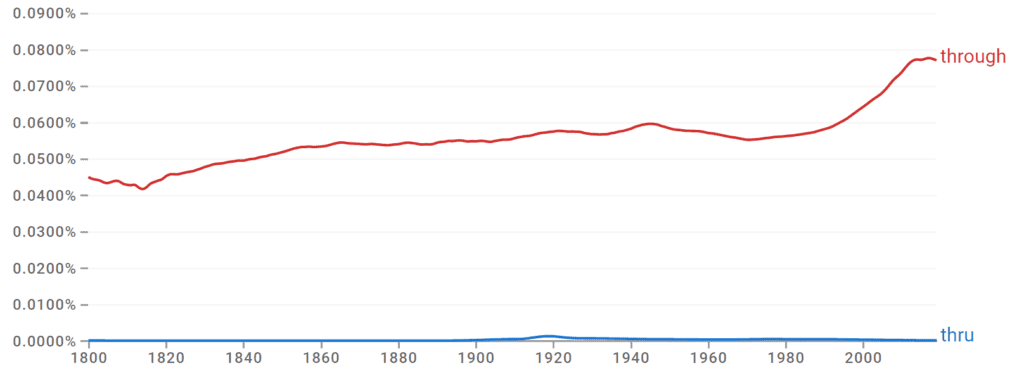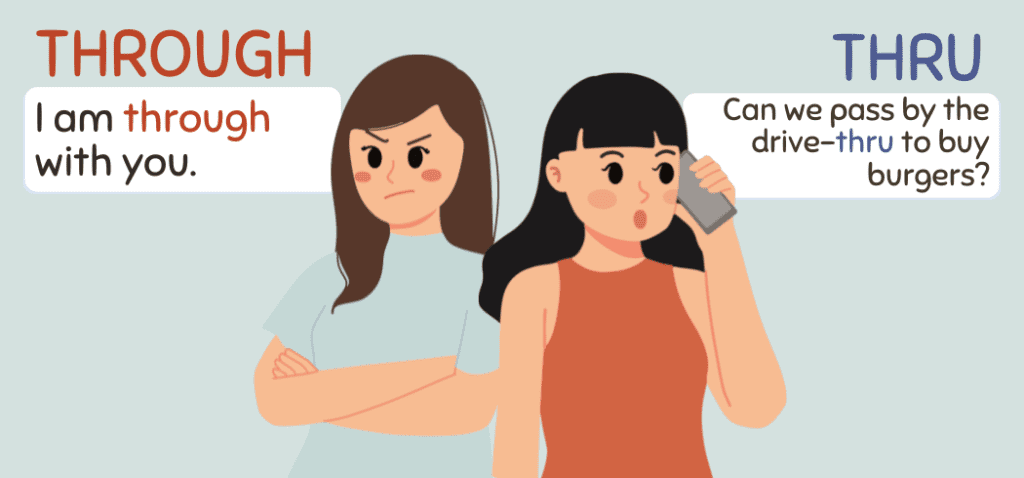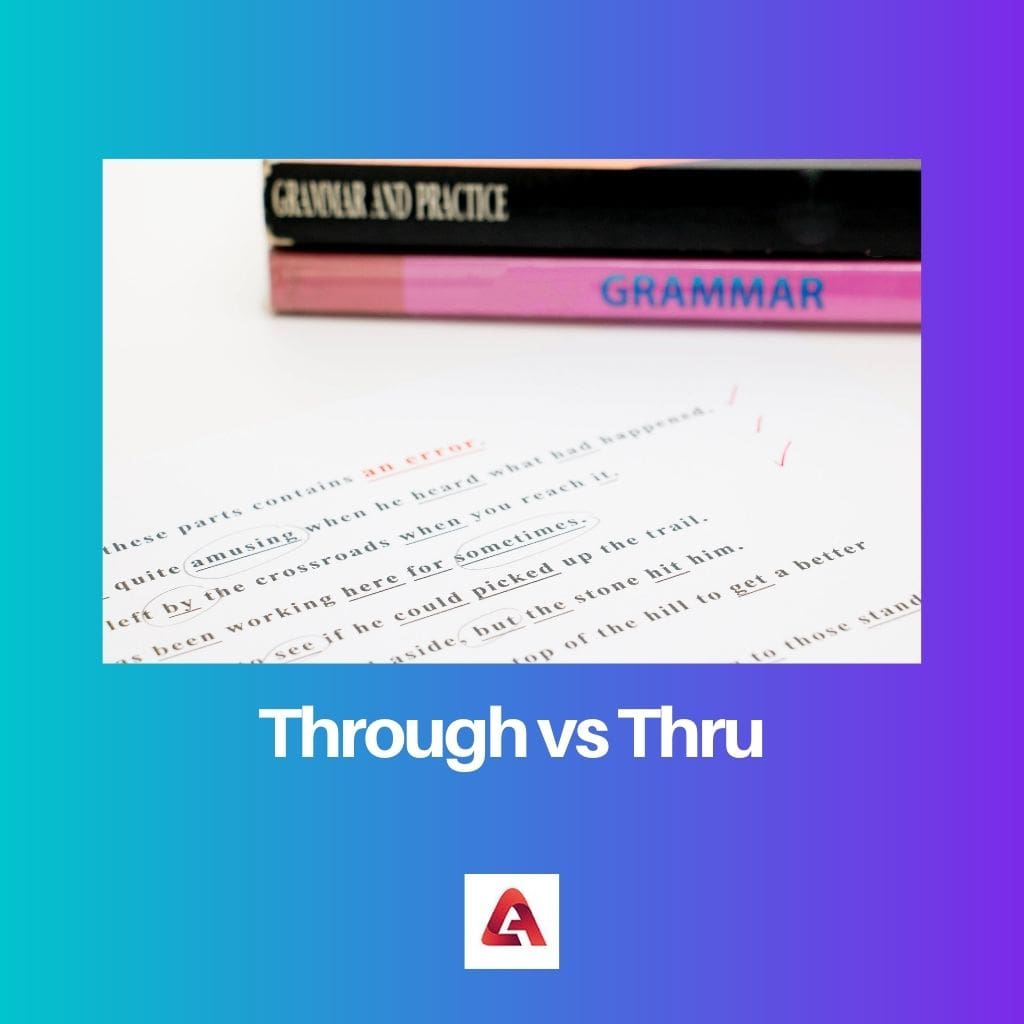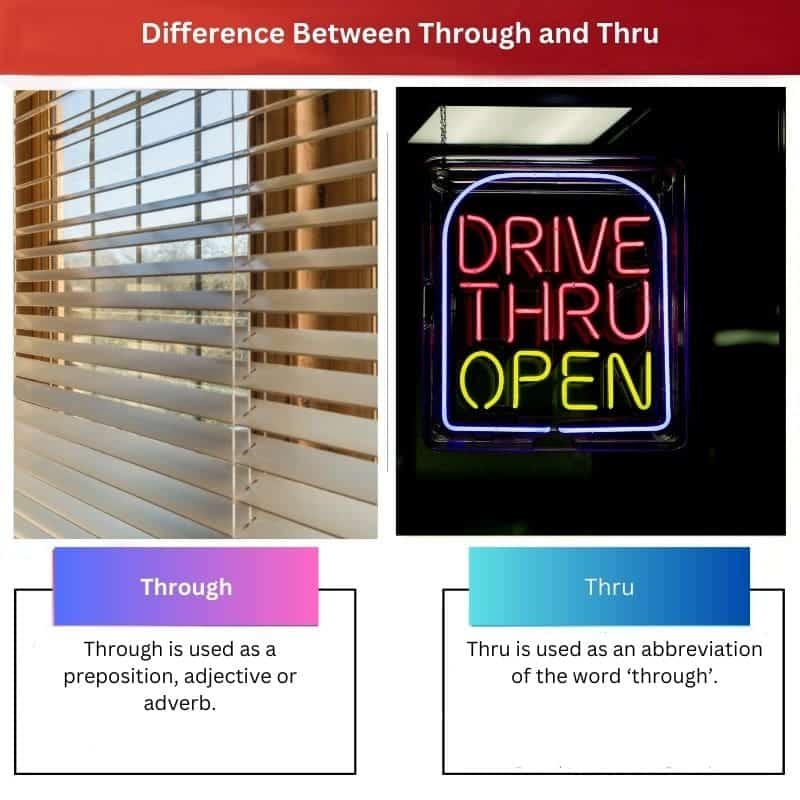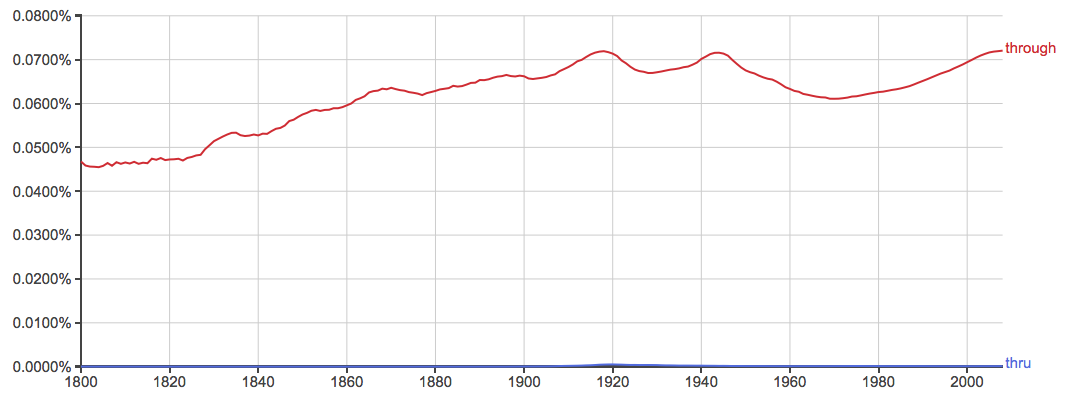Is it “I am going through something” or “I am going thru something”? Is it thru or through? Is thru a word?
Through and thru are both correct. However, one is used in formal writing, while the other is best for informal situations.
My simple guide will show you the difference between through vs. thru with sentence examples.
Through vs. Thru
Through is an appropriate and preferred spelling of the preposition, adverb, or adjective. But you can also use thru as an alternate and informal spelling in informal writing. Thru isn’t necessarily the incorrect spelling, just a non-standard spelling and acceptable choice of slang.
This Ngram shows that through has become the more popular word. The formal and official spelling is widespread in academic papers and professional texts.
Through Meaning
Through is often the correct choice and can be an adverb, preposition, or adjective that can mean:
- From beginning to end.
- During the entire period.
- From one side to another.
It is the only recognized spelling in formal English. Here are some examples of through in a sentence.
- I am through with you.
- The program runs from morning through dinner night.
- My elementary through high school years were the best.
Through also appears in some quotes, idioms, and expressions.
- Through and through (completely or in every aspect)
- Come through (to do what one says shall do)
- Breakthrough (a relevant advance)
- Jumping through hoops (to go through difficult or numerous activities to achieve a goal)
Here are more examples of through in sentences.
- However, he’s made big strides in the past week after progressing to on-court work and game-like movements. He went through practice on Monday and Tuesday, a very good sign signaling his return is near. [NBA]
- Andy Lipow, president of Lipow Oil Associates, tells CNBC that concerns about the age and quality of the shadow fleet carrying Russian crude oil through the Bosphorus will only grow. [CNBC]
Thru Meaning
Thru has become an alternate spelling for through due to text messaging trends and food restaurants. This word has the same meaning:
- From beginning to end
- During the entire period
- From one side to another
Use it only in informal situations and when referring to restaurant drive-throughs. Here are some examples of thru in a sentence.
- Please see this thru.
- I went thru several pages to find your number.
- Can we pass by the drive-thru to buy burgers and chicken nuggets?
- She wants to buy a see-thru dress for her birthday party.
- We saw a sign that said no thru traffic on our road trip.
Here are more examples of news articles that use thru.
- As customers increasingly head to the drive-thru instead of walking inside, major chains are now experimenting with smaller interior footprints. [QSR Magazine]
- Our trusty pals at McDonald’s are doubling down on that promise by introducing a new drive-thru concept that will cut down even more on wait times. [Thrillist]
How to Remember the Difference
The only way to remember through vs. thru is by analyzing the context. Through is the correct spelling. But thru is acceptable in informal situations because the silent letters indicate its informality.
Can I Say “Did Not Go Thru?”
You can only say “did not go thru” in informal situations.
Can I Say “Thru the Door”?
Yes, you can say “thru the door” in informal situations.
Is Through a Preposition?
Through is a preposition that means moving in one side and out of the other. It can also be an adjective or adverb.
Is It “Drive Thru” or “Drive Through”?
Both words are correct. But the informal term drive thru or drive-thru is more popular.
Final Word on Through and Thru
Hopefully, this article has helped you learn when to use thru and through. In most cases, the best choice is through. But if you are in casual conversations or writing formally, you can use thru.
Through and thru are prepositions, adverbs, or adjectives that mean:
- From beginning to end.
- During the entire period.
- From one side to another.
What does thru mean in a letter?
Through Line – “This part appears in the letter if the sender is a subordinate who writes to a person higher in position than his immediate superior. It is a protocol that communications should pass through channels.”
What is the meaning of thru?
Thru , the informal version of the word through, is defined as completely or to the end. An example of thru as an adverb is the phrase drive through town, which means to drive completely around a town. adverb.
Why is it spelled thru?
When English first began its written life, words were spelled according to how they were pronounced. Through began life as the Old English word spelled either as thurh or thuruh. Old English, used from about 500-1100AD, was a completely phonetic language: in other words, you said every letter in the word.
How do you write a formal letter through another person?
How do you write letter format?
- Know when to write a formal letter .
- Write your address and today’s date at the top of the page.
- Write the name and address of the recipient.
- Write the salutation.
- Write the letter .
- Use a complimentary close.
- Fold the letter (optional).
- Address the envelope (optional).
What does Thru and Thru mean?
Through and through is an adverb and means to do something completely, in any manner possible. A good synonym is thoroughly. Sometimes this phrase is used as an adjective with regard to bullet wounds.
Which is correct thru or through?
Through can be a preposition, an adjective, and an adverb. Through is the only formally accepted spelling of the word. Thru is an alternate spelling that should be used only in informal writing or when referring to drive-throughs.
Are you through Meaning?
Are you through ? The phrase could be used to ask if the person has finished the task that is being done at the time of or just before(not long ago) asking. … This phrase represent the past tense and the task could have taken place long ago. 19
What is the hardest word to spell?
Top 10 Hardest Words to Spell
- Misspell.
- Pharaoh.
- Weird.
- Intelligence.
- Pronunciation .
- Handkerchief .
- logorrhea .
- Chiaroscurist.
Is walk thru a word?
Thru is a nonstandard spelling and should generally be avoided. Through is the preferred spelling and is the correct choice for all formal writing.
How do you write a letter through someone?
If you are the sender, write your address.
- Write the date directly below the sender’s address.
- The salutation at the beginning of the letter depends on whether or not you have the name of the person. If you know the name, write the recipient’s name one line beneath the date.
How do you start a formal letter?
Beginning the letter
- Most formal letters will start with ‘Dear’ before the name of the person that you are writing to:
- ‘Dear Ms Brown,’ or ‘Dear Brian Smith,’
- You can choose to use first name and surname, or title and surname. …
- ‘Dear Sir/Madam,’
- Remember to add the comma.
When should you use thru or through?
Through can be a preposition, an adjective, and an adverb. Through is the only formally accepted spelling of the word. Thru is an alternate spelling that should be used only in informal writing or when referring to drive-throughs.
Is it walk thru or walk through?
Both thru and through communicate the same meaning, but one is widely favored over the other. Thru is a nonstandard spelling and should generally be avoided. Through is the preferred spelling and is the correct choice for all formal writing.
Whereas ‘thru’ is a non-standardised version of the word ’through’. That is, it is an alternatively spelt word that means the same as’through’.
Language changes constantly. The changes are nuanced, circumstantial and situational.
A considerable difference can be noticed in the way people text and directly speak to their friends, family, acquaintances and superior officers. One can easily spot the way in which the speech is altered to suit the needs of the situation and the people involved in it.
The words through and thru are examples that also show this contrast.
Key Takeaways
- “Through” is the standard spelling for the preposition and adverb, indicating movement in one side and out the other or completion of a process.
- “Thru” is an informal, colloquial spelling of “through,” often used in casual writing or specific contexts like drive-thru services.
- Both “through” and “thru” convey the same meaning, but “through” is preferred in formal writing and professional contexts.
The difference between the words through and thru is that ‘through’, which acts as a preposition, adjective and adverb on various occasions, is the standard way of presenting the word.
Want to save this article for later? Click the heart in the bottom right corner to save to your own articles box!
Comparison Table
| Parameter of Comparison | Through | Thru |
|---|---|---|
| Usage | Through is used as a preposition, adjective or adverb. | Thru is used as an abbreviation of the word ‘through’. |
| Situation | Through is used in formal situations. | Thru is used in informal situations. |
| Acceptability | Through is acceptable in all contexts. | Thru is acceptable in informal writing. |
| Standard | Through is seen as the standard way of using its meaning. | Thru is not the standard way of using the word and its meaning. |
| Contextual Example | E.g., through the driveway. | E.g., drive-thru. |
What is Through?
The word ‘Through’ generally means movement from one thing to another, from one side to another, etc.
For example, when you say, “I am going through a tunnel”, it means you are moving from one end of a tunnel to another end; that is, you are moving through the tunnel.
This word can also mean continuing with something till its end.
For example, when you say, “She has to get through this level to win the badge, ” that person should go through the entire level and complete it to win the badge.
The word ‘Through’ is also used instead of the phrase “by means of”.
For example, in the sentence, “The company bagged the new deal through promotion and marketing”, the word ‘Through’ is used as an alternative to the phrase “by means of”.
In this context, ‘Through’ means that the company landed on the deal by means of or with the help of promotion and marketing.
This word is also used in several other contexts, such as when you are being connected to another person over the phone or when your relationship with someone has ended.
Here are a few examples to clarify its usage: –
- “Sure, ma’am. Let me put you through to the administrator’s office”.
- “Not one more word from your mouth! I am through with you. Our deal has come to an end”.
The word is also used as a part of the phrase” through and through, ” meaning completely or thoroughly.
Examples: –
- “He is their supporter through and through”.
- ‘Through’ performs the functions of a preposition, adjective and adverb, depending upon the subject of the sentence, its structure and the requirements of the situation.
- ‘Through’ is seen as the standard spelling of the word. It is used in all types of situations, articles and sentences.
What is Thru?
As the introduction mentions, two words can have different spellings by meaning the same.
When and even, your and you’re, you and u are pairs of words that mean the same but have different spellings. The latter is an abbreviated version of the former in all these pairs of words.
Similarly, ‘Thru’ is an abbreviation of the word ‘Through’.
It is a non-formal way of writing ‘Through’. This word is often seen in text messages and other informal writing pieces.
This word is frequently seen on signs at restaurants and even on traffic signals such as ‘no-thru’ signals.‘Thru’ is a non-standard way of writing ‘Through’ and is not accepted in academic and professional writings.
Although there is nothing wrong in texting your friend, “How am I going to get thru the entire syllabus?”; using the word ‘Thru’ in a formal setting or communication thread is seen to be inappropriate.
Thru is an abbreviation of ‘Through’, like message and msg and ‘and’ and ‘nd’.
Main Differences Between Through and Thru
- The main difference between the words ‘through’ and ‘thru’ is that the former is the appropriate word used. But the latter is an abbreviation of the word ‘through’.
- The word ‘Through’ is used in formal writings and communication. The word ‘thru’ is often seen in informal communication and messages.
- ‘Through’ is the accepted way of using the word. But ‘thru’ is not accepted in academic writings, professional articles, and journals.
- ‘Through’ is seen as the standard way of its usage. But ‘thru’ is the non-standard way of its usage.
- While ‘through’ is used as a preposition, adjective and adverb in sentences, ‘thru’ is used in text messages instead of ‘through’ or phrases such as ‘drive-thru’ and ‘no-thru-signals’.
References
- https://www.tandfonline.com/doi/pdf/10.1080/00947679.1979.12066922
- https://heinonline.org/hol-cgi-bin/get_pdf.cgi
Emma Smith holds an MA degree in English from Irvine Valley College. She has been a Journalist since 2002, writing articles on the English language, Sports, and Law. Read more about me on her bio page.
The English language has a lot of confusing words that writers get hung up on. Not knowing when (or how) to use certain words can lead to embarrassing mistakes in one’s writing that are otherwise easily avoided.
Today’s two words are no different; the words thru and through confuse native and non-native English writers alike, but once you know how to use them, they’re a piece of cake.
What is the Difference Between Thru and Through?
Thru and through both have the same meanings and functions in a sentence, but they are spelled differently. They can act as a preposition, an adverb, and an adjective.
- He crawled through/thru the mud to make his way across the field. (Preposition)
- I opened the door and went through/thru. (Adverb)
- This is not a through/thru street; do not enter. (Adjective)
So, is thru or through the preferred spelling? Or is there a preference at all?
In today’s post, I will summarize the current state of thru vs. through usage.
When to Use Thru

- Can you at least see this thru?
- Is the drive-thru still open?
- This is not a thru street; it’s a dead end.
For the most part, thru should be shunned in writing. It has no place in formal writing, but it is used occasionally in informal contexts or stylized branding.
For example, it’s more common to see restaurants advertise a “drive-thru” than a “drive-through.” You might also see traffic signs that say “no thru traffic.” And, oddly enough, the word thru does appear in the IRS Tax Code to refer to “pass-thru” entities, a certain type of corporate structure.
Other than these limited uses, through is the preferred spelling, by an astounding margin (see graph below).
When to Use Through

Not only is this listed as the preferred spelling by usage guides like Fowler’s and Garner’s, it is favored by writers by an absolutely incredible margin.
This Google ngram charts the use of these two words in written books over the last 200 years, and, as you can see, thru barely even registers on the graph.
There is a small blip around 1920, but, aside from that, you can hardly even see the line.
With such as vast disparity in usage, it’s clear to see which is the correct choice between through vs. thru. The correct spelling is undoubtedly through.
Phrases that Use Through
A popular phrase that uses the word through is “through and through.” This means in every aspect; thoroughly or complete.
- These clothes are wet through and through.
- He was a fighter through and through.
Trick to Remember the Difference
How can you remember whether to use through or thru? Here’s a quick trick.
Through has an “O” in its spelling. Think of this “O” as standing for official. Through is the official spelling of the word.
For a discussion of threw vs. through, see here.
Summary
Both thru and through communicate the same meaning, but one is widely favored over the other.
Thru is a nonstandard spelling and should generally be avoided.
Through is the preferred spelling and is the correct choice for all formal writing.
Contents
- 1 What is the Difference Between Thru and Through?
- 2 When to Use Thru
- 3 When to Use Through
- 4 Phrases that Use Through
- 5 Trick to Remember the Difference
- 6 Summary
Through can be a preposition, an adjective, and an adverb. Through is the only formally accepted spelling of the word. Thru is an alternate spelling that should be used only in informal writing or when referring to drive-throughs.
What does Thru and Thru mean?
Although the words “thru” and “through” have the same meaning and are usually used in lieu of each other in sentences, the word “thru” is used informally while the word “through” is used in formal writing. The word “through” is used as a preposition, adjective, or an adverb. It means “to go into” or “to pass into.”
How do you use thru in a sentence?
Using Thru in a Sentence When to use thru: Thru is a non-standard spelling of through. Therefore, it is an incorrect in standard American English, and should be avoided in any academic, formal, or professional writing. You shouldn’t ever find yourself writing the following sentence in an academic paper.
Is thru a slang word?
THRU means «Through» So now you know – THRU means «Through» – don’t thank us. YW! What does THRU mean? THRU is an acronym, abbreviation or slang word that is explained above where the THRU definition is given.

